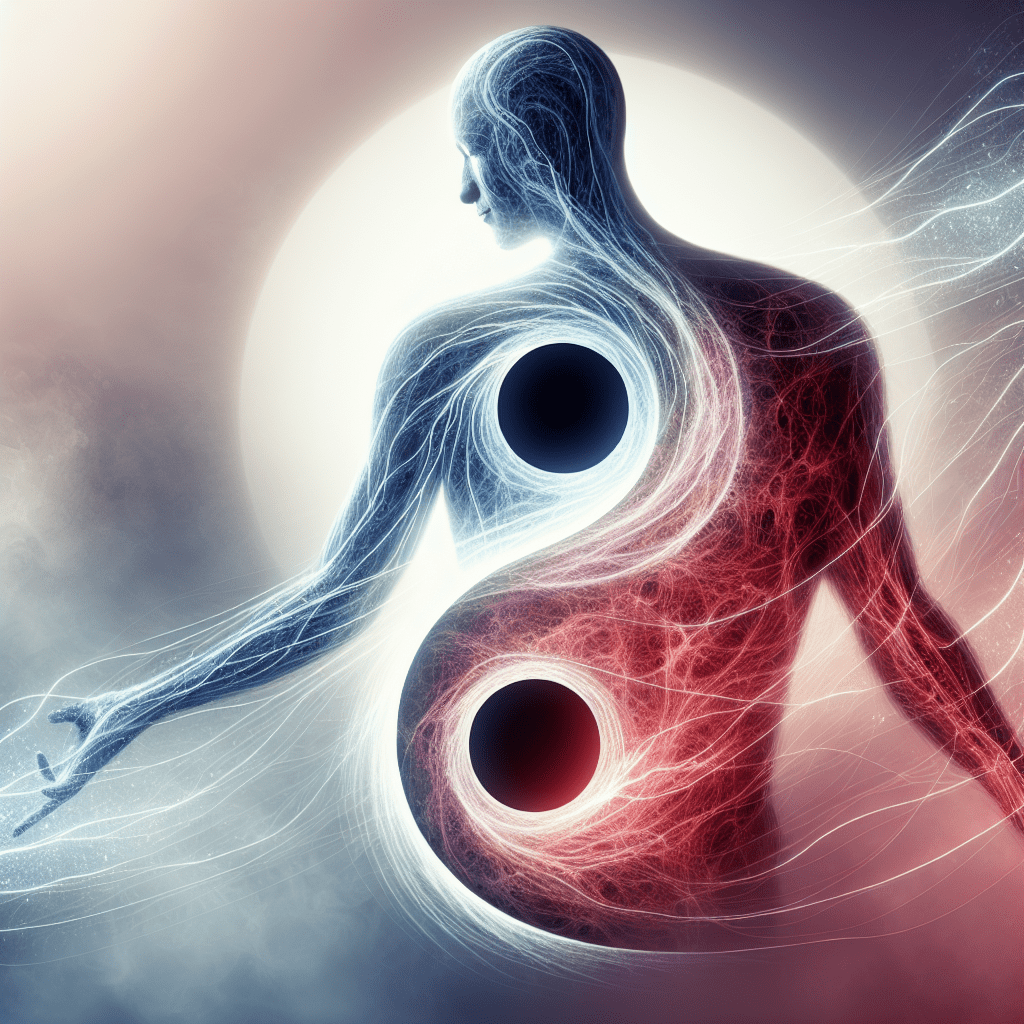Ever felt like something was just “off” with your body, but couldn’t quite put your finger on it? That persistent fatigue that coffee can’t fix, or those random aches that come and go? Your body might be whispering—or rather, screaming—about a Yin-Yang imbalance.
In the hustle of our modern lives, we often ignore these whispers until they become shouts. Traditional Chinese Medicine (TCM) has understood this concept for over 2,000 years: health isn’t just the absence of disease—it’s the presence of harmony within our bodies.
The ancient concept of Yin-Yang balance isn’t just philosophical mumbo-jumbo. It’s a practical framework that explains how opposing forces in our bodies—like rest and activity, cooling and warming, calm and stimulation—need to work together in perfect harmony for optimal health.
Understanding Yin-Yang Balance: The Foundation of Wellness
Imagine Yin and Yang as your body’s natural thermostat. Yang is your warming system—active, energetic, and stimulating. Yin is your cooling system—restful, nurturing, and calming. When these energies are balanced, you feel vibrant and healthy. When they’re not, your body sends signals that something’s amiss.
In TCM, this balance is essential for the smooth flow of qi (life energy) throughout your body. When Yin and Yang are in harmony, qi flows freely, and health flourishes. When they’re imbalanced, qi becomes blocked, leading to various health issues that might seem disconnected but actually stem from the same root cause.
The beauty of understanding Yin-Yang balance is that it offers a holistic lens to view health. Rather than treating isolated symptoms, it looks at the whole picture of your wellbeing. This approach aligns perfectly with what many health-conscious individuals are seeking today—natural solutions that address root causes rather than just masking symptoms.
7 Silent Signals Your Body Is Screaming for Yin-Yang Balance
Let’s explore the key signs that your body’s Yin-Yang balance might be off:
1. Persistent Fatigue That Rest Doesn’t Fix
Do you wake up tired despite getting enough sleep? This could indicate a Yang deficiency. In TCM, Yang energy provides warmth and activity to the body. When Yang is deficient, Yin becomes dominant, leading to a feeling of coldness, a weak pulse, and a notable lack of energy.
Many people mistake this for needing more caffeine or assuming it’s just “normal” aging, when it’s actually a clear signal that your body’s energetic balance needs attention.
2. Hot Flashes and Night Sweats
If you’re experiencing unexplained heat sensations or waking up drenched in sweat, your body might be dealing with a Yin deficiency. Yin energy is cooling and nourishing. Without enough Yin to balance Yang’s heat, your body can feel like it’s overheating, especially at night.
These symptoms are commonly associated with menopause, but they can affect anyone with a Yin-Yang imbalance, regardless of age or gender.
3. Emotional Rollercoasters
Notice yourself feeling irritable one moment and down the next? Emotional instability is a classic sign of Yin-Yang imbalance. In TCM, emotional health is directly connected to physical balance.
Excess Yang can lead to irritability, anger, and anxiety, while excess Yin might manifest as depression, withdrawal, and oversleeping. When balanced, you experience emotional resilience and a stable mood.
4. Digestive Inconsistency
Alternating constipation and diarrhea, bloating, or general digestive discomfort can indicate your digestive system’s Yin-Yang balance is off. The digestive system requires a harmonious balance of activity (Yang) and rest (Yin) to function properly.
Too much Yang can lead to inflammation and hyperactivity in the gut, while excess Yin can cause sluggish digestion and a feeling of heaviness after meals.
5. Sleep Disturbances
Trouble falling asleep or staying asleep might be your body’s way of signaling a Yin-Yang imbalance. Yin energy naturally peaks at night, helping us wind down and rest. If Yin is deficient, Yang energy remains too active, making it difficult to quiet the mind and body for sleep.
Conversely, if you’re oversleeping regularly and still feeling tired, Yang deficiency might be the culprit, as you lack the active energy needed for healthy wakefulness.
6. Chronic Pain or Inflammation
Unexplained pain, especially pain that moves around the body, often points to blocked qi due to Yin-Yang imbalance. In TCM, pain is seen as stagnation—energy that can’t flow freely through the body’s meridians because of imbalance.
Inflammation, particularly chronic low-grade inflammation, can indicate excess Yang without sufficient Yin to cool and calm the body’s tissues.
7. Premature Aging Signs
Have you noticed sudden gray hairs, accelerated skin aging, or decreased vitality? These could be signals of a profound Yin-Yang imbalance affecting your body’s regenerative capabilities.
Yin energy supports nourishment and renewal of tissues, while Yang provides the active energy for cellular processes. When these forces fall out of balance, the aging process can accelerate noticeably.
Modern Lifestyle: The Yin-Yang Disruptor
Our contemporary way of life seems almost perfectly designed to throw Yin and Yang out of balance. Here’s how modern living disrupts this ancient harmony:
Chronic Stress: Yang in Overdrive
Today’s non-stop lifestyle keeps our Yang energy constantly firing. Our bodies stay in “fight or flight” mode, producing stress hormones that keep us in a state of high alert. This constant Yang activation without adequate Yin recovery depletes our energy reserves over time.
Studies show that chronic stress impacts nearly every system in the body, from immune function to digestive health to cognitive performance—all manifestations of Yin-Yang imbalance from a TCM perspective.
Digital Overstimulation: Yin Depletion
The constant notifications, blue light exposure, and mental engagement with screens stimulate Yang energy while simultaneously depleting Yin. Our brains and nervous systems rarely get the downtime needed to restore balance.
This digital yang excess is particularly problematic at night, when our bodies naturally should transition to Yin dominance for rest and recovery.
Processed Foods: Nutritional Imbalance
Modern diets often lack the nutritional diversity needed to support both Yin and Yang aspects of our physiology. Processed foods, excessive sugar, and artificial ingredients create internal heat (Yang excess) while simultaneously failing to provide the nourishment (Yin support) our bodies need.
TCM views food as medicine, with different foods supporting either Yin or Yang energies. Our modern diet rarely considers this energetic balance.
Disconnection from Nature: Rhythm Disruption
Perhaps most fundamentally, we’ve lost touch with natural cycles that once governed human life. Artificial light extends our days, climate-controlled environments shield us from seasonal changes, and urban living separates us from the earth’s natural energies.
These factors disrupt our innate connection to the natural rhythms that help maintain Yin-Yang balance effortlessly.
Restoring Harmony: Practical Steps to Rebalance Yin and Yang
The good news is that Yin-Yang balance can be restored through simple, intentional practices. Here’s how to bring your body back into harmony:
1. Mindful Eating for Energetic Balance
Eastern healing traditions have long understood that food is more than just calories—it’s energy. Certain foods naturally support Yin, while others enhance Yang.
For Yin nourishment, incorporate cooling foods like leafy greens, cucumber, watermelon, and pears. These foods help calm inflammation and provide hydration to tissues.
For Yang support, include warming foods like ginger, cinnamon, lamb, and moderate amounts of good-quality coffee. These foods stimulate circulation and energize the body.
EASTCHI AI’s approach emphasizes personalized nutrition based on your unique constitution, recognizing that food needs vary not just person to person, but also season to season. What balances you in winter might imbalance you in summer.
2. Movement Practices That Balance Rather Than Deplete
Exercise is essential for health, but the type and timing matter for Yin-Yang balance.
Yang-dominant exercises like high-intensity interval training and vigorous cardio can be beneficial for those with Yin excess but may further imbalance someone with Yang excess.
Yin-supportive practices like tai chi, qigong, and yin yoga help circulate energy while simultaneously calming the nervous system—ideal for those with Yang excess.
The key is listening to your body rather than following a one-size-fits-all fitness approach. Some days may call for vigorous movement, while others require gentle restoration.
3. Sleep Optimization for Yin Restoration
Quality sleep is perhaps the most powerful Yin-restoring activity available to us. To enhance sleep quality:
– Establish a consistent sleep schedule aligned with natural light cycles
– Create a cool, dark sleeping environment
– Disconnect from screens at least an hour before bed
– Consider a warm foot bath to draw energy downward from an overactive mind
TCM practitioners also recommend sleeping on your right side initially to support optimal energy flow through the body’s meridians.
4. Stress Management Through Mindfulness
Practices like meditation, deep breathing, and mindful awareness help balance the nervous system, reducing Yang excess and supporting Yin restoration.
Even brief moments of mindfulness throughout the day can help prevent energy imbalances from accumulating. Try the simple practice of taking three conscious breaths whenever you transition between activities.
5. Seasonal Living for Natural Balance
Aligning your lifestyle with seasonal changes supports natural Yin-Yang fluctuations. In winter (Yin season), allow for more rest, introspection, and warming foods. In summer (Yang season), embrace activity, expression, and cooling foods.
This seasonal approach helps your body maintain balance by working with nature rather than against it.
6. Acupressure for Energy Flow
While acupuncture is a powerful tool for balancing Yin and Yang, simple acupressure techniques can be practiced at home. Points like Liver 3 (between the big toe and second toe), Kidney 1 (on the sole of the foot), and Pericardium 6 (inside the wrist) can help restore balance when stimulated gently.
7. Digital Detox for Energy Protection
Regular breaks from technology allow your nervous system to reset and your energy to rebalance. Consider a “sundown shutdown” where screens go off after sunset, or implement tech-free Sundays to give your energy system time to rebalance.
Embracing the Balance: A Path to Vibrant Health
Recognizing the silent signals of Yin-Yang imbalance is the first step toward reclaiming your natural vitality. Rather than viewing these signals as inconveniences to be suppressed, see them as valuable feedback from a body that’s trying to communicate its needs.
By incorporating the wisdom of Eastern healing traditions with modern understanding, you can create a lifestyle that supports rather than disrupts your body’s innate balance. This approach integrates ancient wisdom with contemporary knowledge for optimal wellness.
Remember that balance isn’t a destination—it’s a continuous process of adjustment and attention. Small, consistent actions often have more profound effects than dramatic interventions.
Listen to your body’s whispers before they become shouts. Pay attention to the silent signals. Your body’s wisdom, when properly interpreted through the lens of Yin-Yang balance, offers the most personalized health guidance available.
Are you ready to restore harmony and experience the vibrant health that comes from true Yin-Yang balance? Your body is waiting for you to listen.



